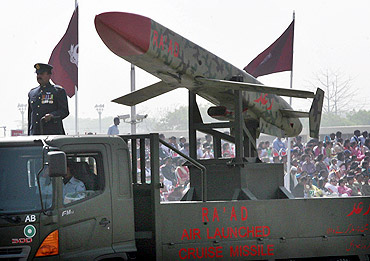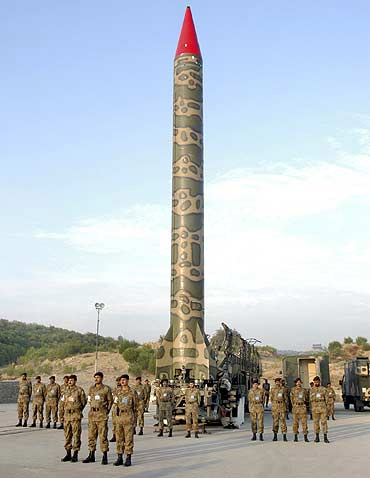This article was first published 14 years ago
Home »
News » Pak N-arsenal: Why India should be really worried
Pak N-arsenal: Why India should be really worried
Last updated on: February 11, 2011 09:19 IST
Image: Pakistan's nuclear-capable air-launched Ra'ad cruise missile
Photographs: Mian Khursheed/Reuters
Harsh V Pant says leakage of Pakistan's nukes is a bigger worry than the number of warheads in its arsenal.
According to the most recent estimates, Pakistan has doubled its nuclear stockpile over the last few years with the nation's arsenal now totalling more than 100 deployed weapons. Pakistan is now ahead of India in the production of uranium and plutonium for bombs and development of delivery weapons.
It is now producing nuclear weapons at a faster rate than any other country in the world. Pakistan will soon be world's fourth largest nuclear weapon state ahead of France and Britain and behind only the United States, Russia and China. It is investing heavily in plutonium production capacity with work reportedly underway on a fourth plutonium-producing reactor at Khushab nuclear complex.
...
Photographs: Reuters
At a time when the US has pushed Pakistani military to shift its focus to the threat from extremist group from within its own borders, the recent reports once again underscore the India-centric threat matrix of Pakistan's military establishment.
The danger is that this expansion is happening at a time of great internal turmoil in the country and the rise in religious extremism.
The fears of proliferation and possible terrorist attempts to seize nuclear materials are real and cannot be brushed aside. Along with the defeat of Al Qaeda, the Obama administration's Afghan War Review of last year has mentioned Pakistan's nuclear security as one of the two long-term strategy objectives in Af-Pak.
In State Department cables released by WikiLeaks last year, concerns about the vulnerability of Pakistan's nuclear material was evident.
Image: Pakistan army at the site from where the Shaheen-1 Medium Range Ballistic Missile was fired
Photographs: Reuters
As the Obama administration was starting to review its Af-Pak policy, an intelligence report suggested that that while Pakistan's weapons were well secured, there was deep, continuing concern about 'insider access', meaning elements in the military or intelligence services.
The then US Ambassador to Pakistan, Anne Patterson, wrote in a separate document that "our major concern is not having an Islamic militant steal an entire weapon but rather the chance someone working in the Government of Pakistan facilities could gradually smuggle enough material out to eventually make a weapon."
Not surprisingly then that even as American officials were trying to persuade Pakistani officials to give up nuclear material, they were quietly seeking to block Pakistan from trying to buy material that would help it produce tritium, the crucial ingredient needed to increase the power of nuclear weapons.
And yet a December 2008 US intelligence briefing to NATO noted that "despite pending economic catastrophe, Pakistan is producing nuclear weapons at a faster rate than any other country in the world."
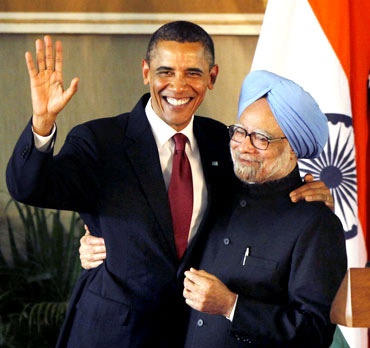
Image: US President Barack Obama with Prime Minister Dr Singh
But any attempt by the US to force Pakistan on the nuclear issue will only generate further suspicion that the US favours India and wants to control Pakistan's nuclear weapons. This, despite the fact that throughout the Cold War years, it was Washington that was critical in giving a boost to Pakistani nuclear programme by wilfully turning a blind eye to nuclear developments in the country.
Today Pakistan accuses the West of double standards and discrimination as the pressure has mounted on Islamabad for signing the Fissile Materials Cut-off Treaty aimed at banning all future production of weapons-grade uranium and plutonium.
A successful conclusion of FMCT by the end of this year is a critical element of the Obama administration's non-proliferation agenda.
In 2009, the US Congress passed a $6.5 billion aid package for Pakistan with the stipulation that the Obama administration provide regular assessments of whether any of the money 'directly or indirectly aided the expansion of Pakistan's nuclear weapons program'. The US has already spent more than $100 million helping Pakistan build fences, install sensor systems and train personnel to handle nuclear weapons.
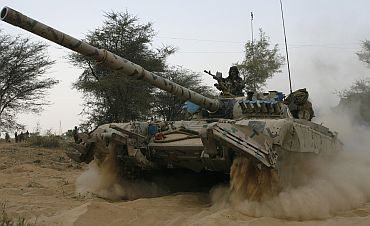
Image: An Indian army tank moves during an army exercise at Pallu, Rajasthan
Pakistan already has more than enough nuclear weapons for an effective deterrent against India. 110 odd nuclear weapons will not make Pakistan's nuclear deterrent more effective as compared to a deterrent based on 60 odd weapons.
Nuclear deterrence doesn't work like that. The higher number will just be used by the military to enhance its prestige by claiming that Pakistan is ahead of India, at least in this realm.
For long, the US and the West have viewed nuclear weapons in South Asia with dread because of the possibility that a conventional war between India and Pakistan might escalate into a nuclear one.
Indian and Pakistani officials, on the other hand, have continued to argue that just as the threat of Mutual Assured Destruction resulted in a 'hot peace' between the US and the former Soviet Union during the Cold War, nuclear weapons in South Asia will also have a stabilising impact.
They point out the fact that despite several provocations, India and Pakistan have behaved 'rationally' during crises by keeping their conflicts limited and avoiding escalation.
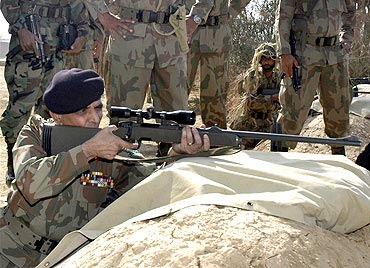
Image: Pakistan Army Chief Gen Ashfaq Parvez Kayani
But since September 11, 2001, the nature of the problem for the West has changed in so far as the threat is now more of Pakistan's nuclear arsenal being used against the West by radical Islamists if they can lay their hands on it.
There is little hope that the rational actor model on which classical nuclear deterrence theory is based would apply as much to militant Islamist groups as it would to the Pakistani government. The turmoil in Pakistan has once again raised concerns about the safety, security and command and control of its nuclear stockpile.
The command and control arrangements continue to be beset with some fundamental vulnerabilities that underline the Pakistani military's reluctance to cede control over the nation's nuclear assets to civilian leaders. It is instructive to note that of all the major nuclear states in world, Pakistan is the only country where the nuclear button is in the hands of the military.
Moreover, senior civilian and military officials responsible for these weapons have a problematic track record in maintaining close control over them. This poses a serious challenge to the Indian credible minimum deterrent nuclear posture.
While India has little to worry about Pakistan's desire to have more than 100 nuclear warheads, the possibility of leakage from the state to non-state actors is a serious threat as it will undermine India's ability to maintain peace in the region.
India should start thinking creatively about the emerging nuclear matrix in the region lest it be overtaken by events on the ground.
